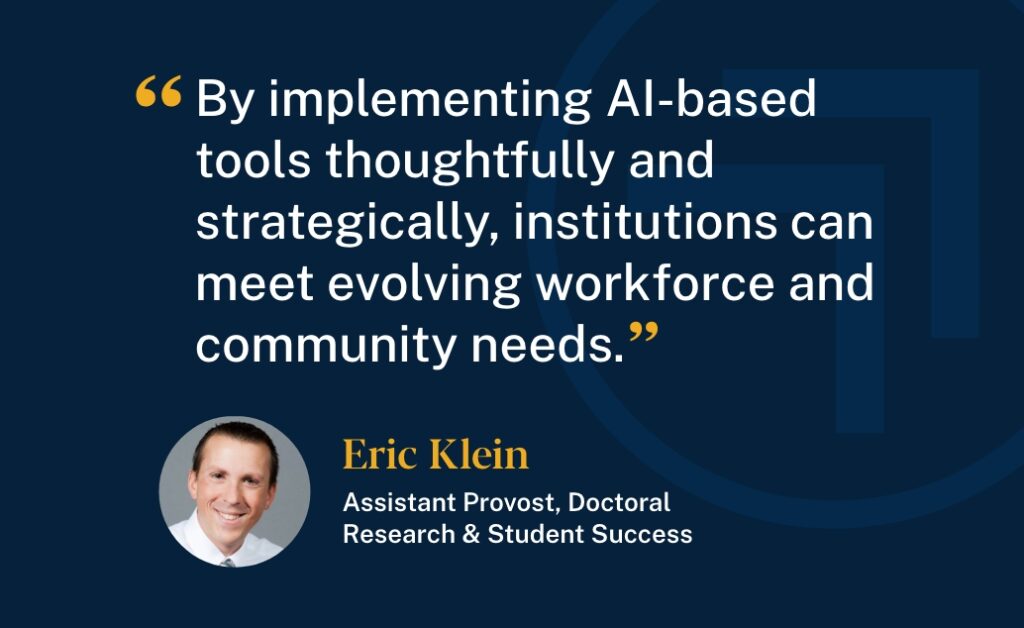
The impact of artificial intelligence (AI) on college learning is transformative for higher education institutions across the globe. Colleges and universities are starting to invest significant time and resources in exploring AI’s potential for their institutions. So what is AI’s role and impact on higher education? Here are some insights for students, faculty, staff and administrators navigating this rapidly evolving higher education landscape.
Key Takeaways:
- AI enables personalized and adaptive learning — platforms can adjust content, pace, and support based on individual student needs, improving engagement and outcomes.
- Efficiency & support tools help educators and admins — AI assists with tasks like generating course materials, giving student feedback, automating routine administrative work, freeing up time for higher-value teaching and mentoring.
- There are ethical, privacy, and integrity challenges — concerns include data security, job-accuracy (hallucinations), plagiarism/academic integrity, and the necessity of responsible policies and oversight.
Benefits and Current Applications
The positive impacts of AI are already in action for students, faculty, researchers, policymakers, and higher education professionals and leaders. Arguably, the greatest benefit for students is personalized learning. Adaptive learning platforms, like Smart Sparrow and DreamBox, can adapt educational content and experiences to meet student needs by providing customized learning resources, experiences and recommendations. This allows students to learn at their own pace and style, which can lead to improved engagement and academic outcomes.
AI for Enhanced Learning Experiences
Adaptive learning platforms can leverage analytics by assessing student data to predict academic performance and identify anyone at risk of falling behind. This enables institutions to get involved proactively and provide the necessary support to help students succeed.
Another incredible benefit with immense potential is AI-powered teaching and learning assistants, which can offer personalized educational support to students and faculty outside the classroom. These systems, like Khanmigo, can answer questions, provide explanations and give feedback on assignments, helping students learn complex concepts at their own pace.
Additionally, by integrating AI into their practices, faculty can enhance efficiency, provide personalized student support and create a more interactive and engaging learning environment. For example, generative artificial intelligence tools like ChatGPT can help faculty develop accessible course materials, including lecture notes, quizzes, assignments and multimedia content.
These tools can also facilitate interactive activities, such as discussions, debates and role-playing exercises, making learning more engaging and dynamic. As an added benefit, tools like Khanmigo and ChatGPT can save time by providing instant feedback and support, which enables more efficient use of study and instructional time.
AI for Professional Efficiency and Effectiveness
AI also offers numerous benefits to higher education professionals, helping them to streamline their work and improve efficiency. For example, tools like Amazon Alexa and Google Assistant can set reminders, manage calendars and automate routine tasks, allowing administrators to focus on high-priority issues.
On a personal level, three of my favorite AI tools are Grammarly, Humantelligence and Microsoft Copilot.
- Grammarly is a writing assistant that provides real-time grammar, spelling, style, tone and punctuation feedback. It can help students and all users produce clear and concise writing, which is essential for academic and professional success.
- Humantelligence is a human resources tool that fosters a more engaging and collaborative work environment. It uses generative AI to provide personalized suggestions for improving email communication, meeting effectiveness and overall team interactions.
- Microsoft Copilot is an assistant that helps users automate tasks and enhance productivity by providing real-time insights and suggestions. I use Microsoft Copilot daily to assist me in drafting emails, creating presentations and summarizing meetings.
Challenges and Ethical Considerations
While the thoughtful integration of AI in higher education has many benefits, there are also significant ethical considerations and challenges. It is important that students and higher education professionals approach AI with a balanced perspective and a mix of curiosity and cautious optimism.
Data Privacy and Content Accuracy
Arguably, the most significant ethical concerns pertain to data privacy and security. AI systems in education may require access to student data to function effectively, which raises key concerns about how this data is collected, stored and used. Institutions must ensure that their student data is secure, and colleges and universities should develop policies and ethical guidelines for the appropriate use of AI.
Another challenge pertains to instances where an AI tool generates misleading or inaccurate information. These instances are referred to as hallucinations. An example of a hallucination may include the creation of a bibliography with books and names that don’t exist. It is critical to incorporate human oversight in the AI tool’s decision-making process to mitigate the risk of AI hallucinations.
Academic Integrity and Plagiarism
Academic integrity is also a prevalent concern due to the potential for plagiarism. Most institutions generally find it acceptable for students to use AI tools for tasks such as brainstorming, generating ideas, finding background information on a topic, clarifying research questions, drafting an outline and checking grammar and style.
However, there is a fine line between acceptable use of AI and relying on it entirely to complete assignments. Institutions should educate all members of their communities about the importance of academic integrity and the ethical use of AI. Additionally, colleges and universities should develop clear policies about using it in academic work, including what is allowed.
In addition to my role as Assistant Provost of Doctoral Research and Student Success at American College of Education (ACE), I serve on an external AI Leadership Council that is dedicated to improving higher education through the responsible use of AI. As part of this council, I am focused on addressing these challenges while developing best practices for the effective and ethical integration of it in higher education.
The Future of Artificial Intelligence in Higher Education
The future of AI in higher education is filled with promise, as several emerging trends and technologies will likely further enhance student success, elevate teaching and learning, streamline operations, and close equity gaps. Whether you are a student, parent, faculty, staff or administrator, the current and future role that AI will play in higher education is sure to impact you.
Virtual and Augmented Reality Experiences
One of the most exciting opportunities for AI is its potential to enhance virtual and augmented reality experiences, creating immersive learning environments that can simulate real-world scenarios and provide hands-on learning experiences.
One example is Labster, which uses AI to create virtual science labs where students can perform experiments and learn complex concepts without being in a physical lab. Another compelling tool is Engage, which is a virtual reality platform that enables faculty to create interactive lessons and virtual field trips. It also uses AI to analyze student interactions to provide insights for improving teaching strategies.
AI and Accessibility
Perhaps the most important current and future trend is the ability of AI to enhance accessibility for students with disabilities. For example, tools such as Microsoft Teams and Otter.ai offer real-time captioning and transcription services that can convert spoken language into text, making discussions and lectures accessible to students with hearing impairments.
Other tools like NaturalReader and Kurzweil 3000 convert written text into spoken words, aiding students with reading disabilities or visual impairments. By leveraging these AI tools, colleges and universities can create more supportive and inclusive learning environments for all students.
In the coming years, AI will undoubtedly provide further advancements and transform higher education by making it more personalized, efficient and accessible. By implementing AI-based tools thoughtfully and strategically, institutions can meet evolving workforce and community needs. In alignment with its mission, ACE is committed to empowering its community members with practical AI skills, shaping the future workforce and driving transformative impact across diverse, evolving communities.
Make a difference in higher education with the M.Ed. in Higher Education program at American College of Education.

